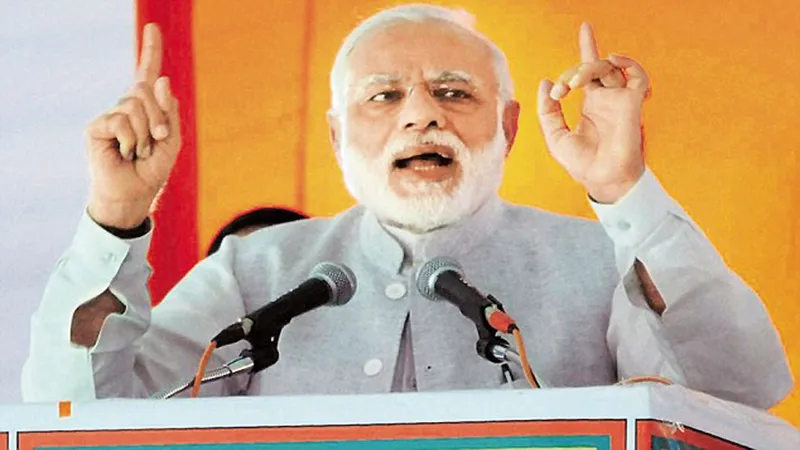-
CENTRES
Progammes & Centres
Location
The NDA II government seems to be displaying a controlling streak rather early in its tenure. Across the land, the word 'ban' seems to have become the leitmotif of its governance style and its personnel seem determined to tell the citizen what he must eat and when, what he can watch, hear or study.

The NDA II government seems to be displaying a controlling streak rather early in its tenure. Across the land, the word 'ban' seems to have become the leitmotif of its governance style and its personnel seem determined to tell the citizen what he must eat and when, what he can watch, hear or study -- or to get established institutions working on their guidance.
Instead of getting on with the job it was elected for -- transformational economic change -- the government seems more obsessed with seeking to manage, guide and, in the ultimate analysis, control the way people live, think and express their views.
This tendency has many manifestations. It is visible in a sense in the way the Ministry of Finance is seeking to control the Reserve Bank of India (RBI).
The Monetary Policy Committee which the finance ministry is proposing is the instrument through which New Delhi would have a controlling majority in deciding issues like interest rates.
Across the world, independent monetary policy decision-making is hard for governments to accept, given their electoral compulsions. Yet, most advanced countries bite the bullet on that score because stable and sustained economic growth requires a steady and impartial hand at the monetary tiller.
The problem is that the Modi government has not done its bit to reform and restructure the economy to promote growth, so it is looking for cheap victories by forcing the central bank to lower interest rates as a means of giving a spurt to economic growth.
Such a process could hurt the longer-term prospects of the economy, but the governments in democratic countries usually look at the world in five-year cycles.
Another instance of this tendency is the sedition order issued by the Maharashtra government. This calls on the police to keep in mind that the sedition clause in the Indian Penal Code (IPC) can be invoked against those who, using either spoken or written words, display "contempt" and "dissatisfaction", thereby provoking violence against the central or state governments, including public representatives like ministers, zila parishad chairmen, mayors or MLAs.
Sedition is a very serious charge and in democracies it relates to the 'state' or 'nation' and not 'governments'.
Attacking a chief minister or minister can hardly be termed sedition, whereas seeking to overthrow the government system - as Maoists or jihadists seek to do - certainly can.
What is embarrassing is the role of the government, formed of a party who consider themselves great nationalists.
It is a shame that a duly-constituted government in a state of India in 2015, is seeking to hide behind a statute where words like 'disaffection', and 'sedition' all come from an entirely different context of the mechanisms of colonial control of the people of India.
The IPC was part of a series of measures that the British colonial government instituted in 1860 to control India after they had brutally crushed the Great Rebellion of 1857.
A third instance of the domineering tendency of the Modi government has been the now-withdrawn encryption policy.
The draft guidelines proposed would have had people keeping plain-text versions of their WhatsApp, Facebook, and Google messages for 90 days and make them available to the security agencies.
The timing of the leak, on the eve of Prime Minister Narendra Modi's visit to the United States where he was scheduled to meet the Silicon Valley grandees like Mark Zuckerberg and other top executives, cannot but have been embarrassing.
So it is not surprising that the information and technology ministry claims that the fault lay in the poor drafting of the guidelines rather than any intrinsic desire to restrict freedoms.
National security
Tussles relating to the making of monetary policy are not unusual in other parts of the world.
But the other two issues are uniquely Indian and contemporary. They represent the salience of national security bureaucracies in the everyday life of the country.
This is manifested separately by the tendency to conflate the threat of terrorism in the country, despite the fact that there has been no serious terror incident in the country since the Mumbai attack of 2008.
Terrorism remains a challenge and can lead to a tragic loss of life and generate fear, but by itself terrorism is hardly an existential threat of any kind to the country.
Despite this you hear a policy narrative that seeks to show that terrorism is the biggest threat that this country faces.
For that we now have a tough government which will not brook sedition, keep a determined watch on the enemies of the state and give short shrift to Pakistan. The aim is to give the government a nationalist sheen.
By punching at shadows, it hopes to keep the country enthralled with its prowess, while the real problems and threats continue to grow.
(The writer is a Distinguished Fellow at Observer Research Foundation, Delhi and Contributing Editor, Mail Today)
Courtesy: Mail Today, September 27, 2015
The views expressed above belong to the author(s). ORF research and analyses now available on Telegram! Click here to access our curated content — blogs, longforms and interviews.

Manoj Joshi is a Distinguished Fellow at the ORF. He has been a journalist specialising on national and international politics and is a commentator and ...
Read More +